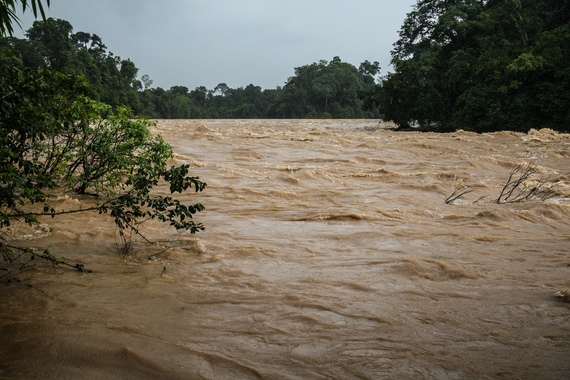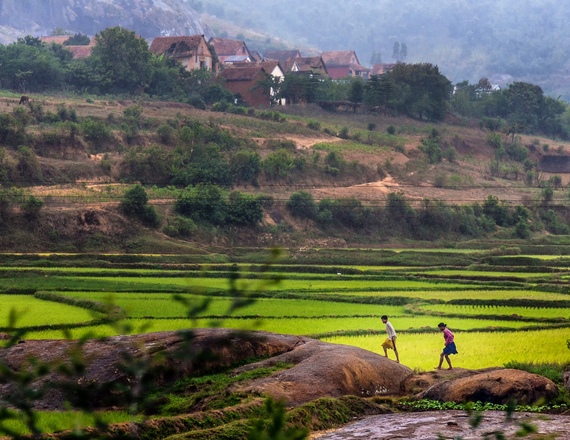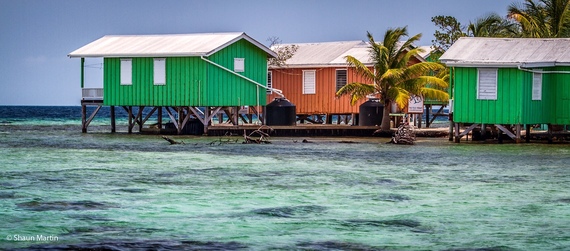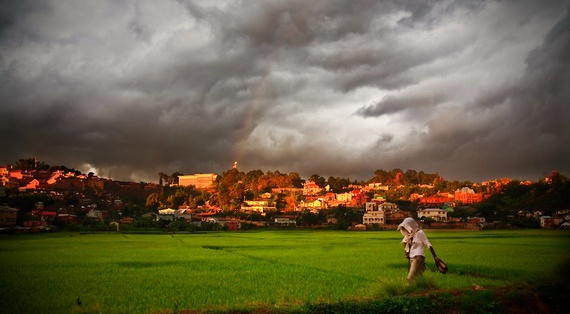If you lived in Honolulu and suddenly relocated to Minneapolis, it's fair to say you would need to make a few lifestyle adjustments. You would have to buy warmer clothes, learn how to drive in icy conditions, and perhaps even trade in your surfboard for cross-country skis. In short, you would have to adapt to an unfamiliar climate.
Places like Madagascar are experiencing stronger cyclones. Forests can help prevent soil erosion in the country's steep hillsides. Photo Credit: © Shaun Martin
These days, you don't need to move somewhere far away to experience a different climate: a new climate is moving to you. In today's warming world, adapting to climate change is a necessity facing every family, community, industry and nation. Climate change is already affecting where and how we grow our food, how much water we have to drink, and which places are safest to build our homes. We must rethink all of the implications climate change has on our daily lives and if we're equipped to manage situations we haven't experienced before. For example, how will we fight longer and more intense forest fire seasons, manage outbreaks of new diseases and repair homes and property continually damaged by increasingly frequent extreme weather events?
Adapting to climate change is perhaps the greatest test that humankind has ever faced. And, we must use every tool at our disposal to address this global challenge.
One tool that's getting lots of attention here at the IUCN World Conservation Congress is called "ecosystem-based adaptation," or the use of nature to help people adapt to the adverse consequences of climate change. The concept is simple. Anyone who has sought refuge from the heat under a shady tree understands that living things around us can make us more comfortable and safer under unpleasant or threatening circumstances. Similarly, it stands to reason then as we prepare more frequent and intense heat waves, cities might consider increasing green spaces with lots of trees to protect people from exposure to dangerously high temperatures. This simple idea is what ecosystem-based adaptation might look like.
Wherever we look, nature can play an important role in preparing us for a changing climate.
If your community is subject to more frequent flooding, wetlands can provide a natural buffer to absorb excess water that would otherwise damage homes and infrastructure. Coastal communities benefit from mangroves that provide protection from storm surges associated with hurricanes and typhoons. And wild plants that are well-suited to hot and dry climates may become more valuable as we seek new sources of food and medicine.
And yet, despite the value these natural systems provide for our health, welfare and public safety, too often we destroy them for short-term gain. We clear forests for agricultural plantations, cut down mangroves for coastal development, dam rivers and drain wetlands. When we degrade these natural systems, not only do we erode nature's ability to sustain itself, these actions increase our own vulnerability to the effects of climate change. In fact, the greatest irony is that the very plantations, coastal development and dams we are creating are themselves at greater risk of failure due to climate change, particularly when nature is no longer available to protect them.
The moral of this tale is simple: protecting nature helps us protect ourselves from the changing climate. Ecosystem-based adaptation is a promising yet largely untapped innovation that can help people prepare for an uncertain future. We can no longer afford to willfully destroy the natural world at a time when we need it more than ever. Nature is our best hope for the future.
This post is part of a series on the World Conservation Congress taking place this week. Held every four years, it brings together about 6,000 people, including heads of state, government officials, business leaders, representatives from indigenous groups, scientists, academics, influencers, educators, artists and NGOs, from all over the world to discuss and decide on solutions to the world's most pressing environmental challenges.
Homes like these in Belize could benefit from the protection of mangrove ecosystems, which help reduce damage from storm surge and strong waves. Photo Credit: © Shaun Martin
The threat of climate change looms large over countries like Madagascar. Nature can help reduce the vulnerability of its people. Photo Credit: © Shaun Martin




